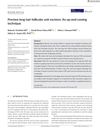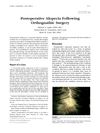 October 1996 in “Dermatologic Clinics”
October 1996 in “Dermatologic Clinics” Research on hair disorders has advanced, with promising future progress in understanding and treating these conditions.
 68 citations,
May 2016 in “Experimental dermatology”
68 citations,
May 2016 in “Experimental dermatology” FFA's causes may include environmental triggers and genetic factors.
 117 citations,
November 2006 in “Experimental Dermatology”
117 citations,
November 2006 in “Experimental Dermatology” The article concludes that the wool follicle is a valuable model for studying tissue interactions and has potential for genetic improvements in wool production.
 1 citations,
March 2023 in “Clinical, Cosmetic and Investigational Dermatology”
1 citations,
March 2023 in “Clinical, Cosmetic and Investigational Dermatology” Current treatments for Alopecia Areata have mixed success, and there's a need for better, more accessible options and support for affected individuals.
 18 citations,
April 2010 in “Actas Dermo-Sifiliográficas”
18 citations,
April 2010 in “Actas Dermo-Sifiliográficas” Follicular unit hair transplantation is the standard method for natural-looking hair restoration in androgenic alopecia.
 2 citations,
December 2021 in “ScienceRise”
2 citations,
December 2021 in “ScienceRise” The best way to extract oil from Urtica dioica roots is by using corn oil, a 1:5 ratio of raw material to extract, extracting for 6 hours, and using the maceration method.
 April 2024 in “Bioactive materials”
April 2024 in “Bioactive materials” New microneedle treatment with growth factors and a hair loss drug shows better and faster hair growth results than current treatments.
 4 citations,
June 2021 in “Scientific Reports”
4 citations,
June 2021 in “Scientific Reports” Hair fiber shape and curvature are not significantly linked when ancestry is considered.
 2 citations,
August 2021 in “Dermatologic Surgery”
2 citations,
August 2021 in “Dermatologic Surgery” The research found specific facial points that help create natural-looking beard lines for better beard restoration.
 April 2024 in “The Egyptian Journal of Hospital Medicine ”
April 2024 in “The Egyptian Journal of Hospital Medicine ” Current treatments for androgenetic alopecia manage symptoms but don't cure it, and it affects social and psychological well-being.
 65 citations,
February 2017 in “Pflügers Archiv - European Journal of Physiology”
65 citations,
February 2017 in “Pflügers Archiv - European Journal of Physiology” Macrophages are vital for skin healing, hair growth, salt balance, and cancer defense.
 290 citations,
December 2017 in “Journal of The American Academy of Dermatology”
290 citations,
December 2017 in “Journal of The American Academy of Dermatology” Alopecia areata is an autoimmune condition causing hair loss, influenced by genetics, stress, and diet, and may be prevented by a high soy oil diet.
 1 citations,
July 2023 in “Cureus”
1 citations,
July 2023 in “Cureus” Some treatments for hereditary hair loss are effective but vary in results and side effects; new therapies show promise but need more research.
 5 citations,
January 2019 in “Elsevier eBooks”
5 citations,
January 2019 in “Elsevier eBooks” Current therapies cannot fully regenerate adult skin without scars; more research is needed for scar-free healing.
 6 citations,
July 2003 in “Journal of Womens Health”
6 citations,
July 2003 in “Journal of Womens Health” Experts say proper treatment and sensitivity are important for women's facial skin issues like acne and unwanted hair.
 3 citations,
February 2021 in “Journal of Cosmetic Dermatology”
3 citations,
February 2021 in “Journal of Cosmetic Dermatology” Long hair FUE, a hair transplant without shaving, is becoming more popular and surgeons should learn it.
 3 citations,
March 2023 in “Scientific Reports”
3 citations,
March 2023 in “Scientific Reports” Researchers developed a new method to test hair growth drugs and found that adult cells are best for hair growth, but the method needs improvement as it didn't create mature hair follicles.
 8 citations,
March 2022 in “Journal of The Taiwan Institute of Chemical Engineers”
8 citations,
March 2022 in “Journal of The Taiwan Institute of Chemical Engineers” Extracts from a type of brown seaweed can help promote hair growth.
 9 citations,
August 2008 in “Journal of Oral and Maxillofacial Surgery”
9 citations,
August 2008 in “Journal of Oral and Maxillofacial Surgery” A woman experienced temporary hair loss after jaw surgery, which can be reduced by careful head positioning during the operation.
 1 citations,
June 2007 in “Journal of Oral and Maxillofacial Surgery”
1 citations,
June 2007 in “Journal of Oral and Maxillofacial Surgery” A woman experienced temporary hair loss after jaw surgery due to the stress of the operation.
 March 2009 in “Journal of The American Academy of Dermatology”
March 2009 in “Journal of The American Academy of Dermatology” AGA patients have higher rates of metabolic syndrome and carotid atheromatosis, suggesting early screening and prevention is important.
 32 citations,
June 2015 in “PLOS ONE”
32 citations,
June 2015 in “PLOS ONE” Olive leaf compound oleuropein helps grow hair in mice.
 3 citations,
August 2006 in “Facial Plastic Surgery Clinics of North America”
3 citations,
August 2006 in “Facial Plastic Surgery Clinics of North America” Newer midface lift techniques are safer, more reliable, and have quicker recovery times.
 12 citations,
August 2017 in “Archives of Pharmacal Research”
12 citations,
August 2017 in “Archives of Pharmacal Research” Lecithin-based microparticles can deliver minoxidil for hair growth effectively with less skin irritation.
 35 citations,
June 2017 in “Pharmaceutical research”
35 citations,
June 2017 in “Pharmaceutical research” Researchers developed a model that shows hair follicles increase skin absorption of caffeine by 20%.
 18 citations,
January 2017 in “Postępy Dermatologii i Alergologii”
18 citations,
January 2017 in “Postępy Dermatologii i Alergologii” EGFR inhibitors can cause various skin issues during cancer treatment, and managing these is important for patient care.
 153 citations,
January 2001 in “Science”
153 citations,
January 2001 in “Science” Using CDK inhibitors on rats showed a reduction in chemotherapy-caused hair loss, but later experiments could not repeat these results.
 August 2013 in “Facial Plastic Surgery Clinics of North America”
August 2013 in “Facial Plastic Surgery Clinics of North America” Hair restoration techniques and new cell sources improve hair loss treatments.
 May 2024 in “Indian journal of pharmacy and pharmacology”
May 2024 in “Indian journal of pharmacy and pharmacology” Luliconazole is more effective than ketoconazole at repairing damaged hair cuticles.
 1 citations,
June 2013 in “Science-business Exchange”
1 citations,
June 2013 in “Science-business Exchange” Increasing the levels of a protein called FGF9 can promote hair growth, but humans may not respond the same way due to a lack of certain cells.






























